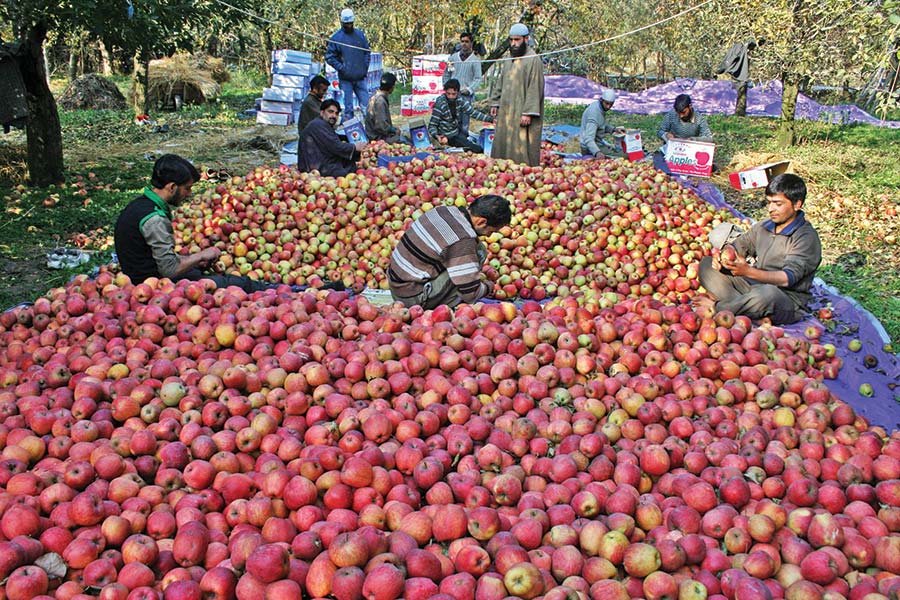
Apple orchards have become a very important part of the economy of several parts of the Himalayan region in India. This is particularly true of Kashmir and Himachal Pradesh, and to a lesser extent Uttarakhand. However in recent times the orchard owners and local apple traders have become increasingly worried about the increasing imports of cheaper apples from Iran. These are reported to be of lesser quality but being cheaper can dominate an important segment of the market.
This is not the first time of course that the domestic apple market has been threatened by an excessive presence of imported produce. At one stage the bigger threat was from USA apples and then there was the threat from Chinese apples. As both the USA and the Chinese farm exports are known to be heavily supported by their governments, there was understandable concern regarding the harm the domination of imports from these sources may cause to our domestic producers.
An additional concern related to contamination by new insects and other contaminants which it has been reported have come with some import consignments and fears have been expressed that these may make a more permanent presence in Indian orchards. Such concerns have been expressed regarding imports from Iran as well. There is a concern that the Iran crop has found it difficult to find its more common markets due to sanctions or hostilities and hence maybe marketed at extra low price and lower margins in India, increasing the threat to domestic producers.
In a welcome development the orchard owners and traders in Kashmir, Himachal and Uttarakhand have been establishing more mutual contacts and it is good to see that they are speaking with one voice on the need to protect their domestic market. Of course India has no hostility towards Iran at all and would not mind a limited amount of their apples coming in, but of course the first right over the indian market is that of local producers and we should protect their interests.
Representatives of local producers and traders have been issuing statements pointing out that the union government at a high level has gone back on its earlier promises of imposing higher tariffs on apple imports. This has also taken a political turn. On February 8 a leading Congress leader of Himachal Pradesh issued a statement indicting the union government for neglecting the interests of apple growers and failing to either fulfill its promise to increase import tariffs on apple or to make available a fair price to apple growers. This statement has been highlighted in several newspapers.
It may be recalled here that at the time of apple procurement crisis a crisis situation had arisen for some time when the price suddenly decreased and the chief minister of Himachal Pradesh asked for postponing plucking of fruit for some time. This had spread resentment among orchard owners. Some apple growers and local traders also pointed fingers at the role of a leading business house in the fall of price. As those were days of the farmers’ movement being in full swing at a wider level and as issues raised there were similar of corporate domination, this allegation got much attention and senior farmer leaders like Rakesh Tikait visited Himachal Pradesh, resulting in some initial efforts to strengthen the farmers’ movement in the hilly areas as well.
It is good that now representatives of apple growers and traders in three hill ststes have started getting together and it is hoped that this will enable them to raise their demands, particularly in the context of avoiding unfair competition from imports, in a more effective way. This growing unity wll also be helpful later in protecting their interests from big business houses.
However in addition apple growers should also give more attention to protecting the environmental base of orchards, which has been harmed in some places by indiscriminate sprays of pesticides and even growth regulators, harm to natural pollinators, indiscriminate import of planting material and other factors. There should be more emphasis on ecologically protective practices.
The trend towards converting more of the apple crop into wine, turning a high nutrition fruit into intoxicant and then selling this wine along with nutritious fruit products seen at some places has been harmful and will prove to be even more harmful in future. Instead of such harmful processing encouragement of self-help groups of women to produce apple jam and other similar produce is needed. In this way the lower-end or less attractive looking fruit can also be utilised properly. Apples should also be procured by the government to supply in mid-day meals in anganwadis, either as raw fruit or as freshly prepared jam or in the form of other local cooked dishes. This would be a good way of ensuring that the poorest among the local people also get the nutrition benefits of this popular fruit.
Bharat Dogra is Honorary Convener, Campaign to Save Earth Now. His recent books include Man Over Machine and Protecting Earth for Children.









































